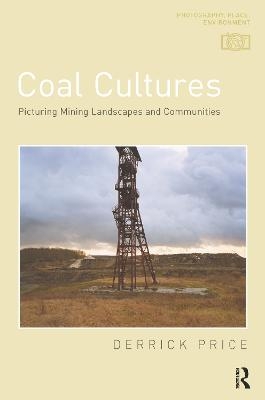
Coal Cultures
Picturing Mining Landscapes and Communities
Seiten
2018
Bloomsbury Visual Arts (Verlag)
978-1-350-03783-0 (ISBN)
Bloomsbury Visual Arts (Verlag)
978-1-350-03783-0 (ISBN)
- Titel z.Zt. nicht lieferbar
- Versandkostenfrei
- Auch auf Rechnung
- Artikel merken
Coal is the commodity that powered the technologies that made the modern world. It also brought about unique communities marked by a high degree of social solidarity and self-help. Mining was central to working class life, drawing rural populations into industrial labour, but it often took place in picturesque landscapes, so that its black spoil heaps became a central symbol of the degradation of pastoral life by the demands of an extractive industry.
Throughout Europe and the USA photographers have pictured the characteristic landscapes of the industry, and continue to do so as strip mining devastates huge areas of land. Not only landscape photography but also documentary, portraiture, photojournalism and art photography have been used in order to portray mines and miners. This book presents three interlinked strands of investigation. The first is the way in which the production of coal created paradigmatic communities grounded in particular landscapes. The second concerns the role of photography in exploring, delineating and critiquing mining communities. This in turn involves an examination of the aesthetic and social characteristics of a number of genres of photography. Lastly, it considers the growth and decline of these sites, the geographic shift of the industry to other places, and the re-presentation of traditional localities through the lens of the heritage industry and industrial tourism.
Throughout Europe and the USA photographers have pictured the characteristic landscapes of the industry, and continue to do so as strip mining devastates huge areas of land. Not only landscape photography but also documentary, portraiture, photojournalism and art photography have been used in order to portray mines and miners. This book presents three interlinked strands of investigation. The first is the way in which the production of coal created paradigmatic communities grounded in particular landscapes. The second concerns the role of photography in exploring, delineating and critiquing mining communities. This in turn involves an examination of the aesthetic and social characteristics of a number of genres of photography. Lastly, it considers the growth and decline of these sites, the geographic shift of the industry to other places, and the re-presentation of traditional localities through the lens of the heritage industry and industrial tourism.
Derrick Price is a freelance writer and independent scholar who has published widely on photography and film. He currently Chairs the Board of Ffotogallery, the photography agency of Wales.
Table of Contents List of Illustrations Introduction 1. Degradation and regeneration 2. Images of miners 3. Mining communities 4. Fog, smog and pollution 5. Strikes and conflict 6. The new landscape of coal 7. Heritage, memory and nostalgia Conclusion Index
| Erscheinungsdatum | 28.12.2018 |
|---|---|
| Reihe/Serie | Photography, Place, Environment |
| Sprache | englisch |
| Maße | 156 x 234 mm |
| Gewicht | 560 g |
| Themenwelt | Kunst / Musik / Theater ► Fotokunst |
| Geschichte ► Teilgebiete der Geschichte ► Kulturgeschichte | |
| Naturwissenschaften ► Geowissenschaften ► Geografie / Kartografie | |
| Technik ► Bergbau | |
| ISBN-10 | 1-350-03783-4 / 1350037834 |
| ISBN-13 | 978-1-350-03783-0 / 9781350037830 |
| Zustand | Neuware |
| Haben Sie eine Frage zum Produkt? |
Mehr entdecken
aus dem Bereich
aus dem Bereich
der stille Abschied vom bäuerlichen Leben in Deutschland
Buch | Hardcover (2023)
C.H.Beck (Verlag)
CHF 32,15
vom Mittelalter bis zur Gegenwart
Buch | Softcover (2024)
C.H.Beck (Verlag)
CHF 16,80
Die Revolution des Gemeinen Mannes
Buch | Softcover (2024)
C.H.Beck (Verlag)
CHF 16,80


